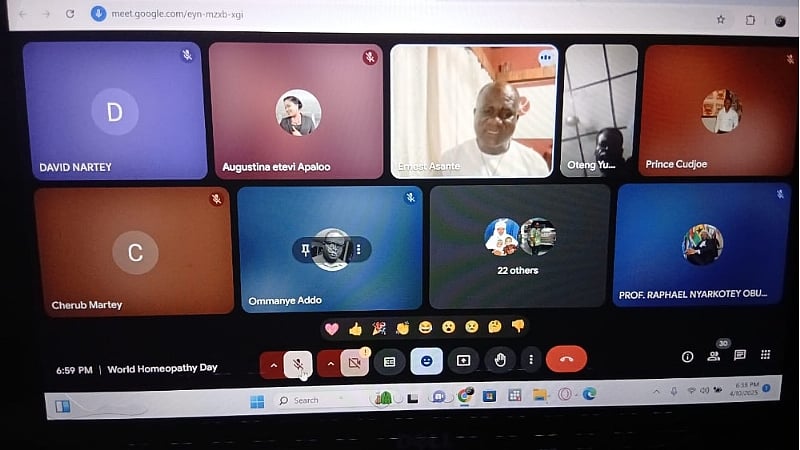In a historic virtual gathering, the Ghana Alternative Medical Practitioners Association (GAMPA) commemorated World Homeopathy Day for the first time on April 10, 2025.
The event brought together pioneers in the field of homeopathy to share expert knowledge, encourage collaboration, and envision a bold future for the practice in Ghana and across Africa.
Held under the theme “Homeopathy Doesn’t Fail, the Practitioner Does,” the public lecture attracted a diverse audience of local and international thought leaders, students, and practitioners of natural medicine. The session was moderated by Prof. Raphael Nyarkotey Obu, General Secretary of GAMPA, a respected naturopath and legal scholar.
Among the distinguished speakers was Dr. Adu Boateng, CEO of Endpoint Homeopathic Clinic, who spoke passionately about the power of homeopathy in boosting immunity and healing damaged organs. He urged practitioners and students alike to reject shortcuts and invest in proper training. “We must be disciplined and committed to the core values of our practice,” he stated, stressing the importance of unity among homeopaths in Ghana and Africa.
Dr. Ernest Asante, President of the Ghana Homeopathic Medical Association, delivered a compelling address that inspired the event’s theme. “Homeopathy doesn’t fail, the practitioner does,” he said, pointing to the need for rigorous understanding of homeopathic principles and meticulous case-taking. He also advocated for the integration of homeopathy into Ghana’s mainstream healthcare system, citing its potential to address the country’s increasing burden of chronic diseases.
GAMPA President Dr. Albert Arthur called for greater standardization in homeopathic education and clinical practice. He emphasized the urgency of stakeholder collaboration to ensure quality assurance, ethical conduct, and broader professional recognition of homeopathy within the national framework.
The keynote speaker, Dr. Matina Chronopoulou from the United States, shared valuable lessons from the Greek experience with homeopathy. She described its successful application in primary healthcare settings and encouraged Ghanaian practitioners to adopt global best practices while tailoring them to the unique needs and cultural context of Africa.
Attendees described the lecture as enlightening, timely, and deeply inspiring. Many expressed support for making such public engagements a regular feature in Ghana’s alternative medicine calendar and called for the development of structured training programs to guide the next generation of homeopathic practitioners.
Organized by GAMPA, the event marks a significant milestone in the advancement of homeopathy in Ghana. It signals the beginning of a more unified and professional era for the practice across the continent.


